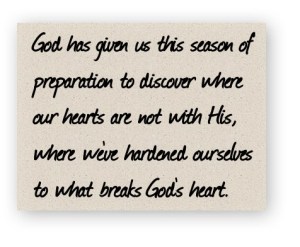“There is an appointed time for everything. And there is a time for every event under heaven.”
Ecclesiastes 3:1
It’s here! Christmas Eve. Presents are wrapped, delicious food awaits us, family and friends are close. We look forward to this evening and tomorrow morning all year. For some, the journey to Christmas morning is simply from our bedrooms to our living rooms. Others travel many miles to join in the celebration. In fact, AAA recently estimated that this year over 112 million Americans will travel in some form this Christmas.

One of our biggest concerns when we take a trip, especially during the holidays, is whether we’ll get to our destination on time. Crowded airports, busy highways, overbooked hotels … when will we get there? Our travel plans sometimes seem more pressing than our travel destinations.
A different journey
There is another journey we should remember today as another Advent ends. A journey made by our Creator spanning the infinite stretches of time and space, from thought to Word to flesh to Salvation. It is the reason we celebrate this day, the Eve “O Come” became “Emmanuel.”
The Jesus so often stylized in paintings and song seems at odds with the Jesus of history. He was not born to princely riches, surrounded by the comforts of an Eternal throne. His arrival was greeted with a brief night of fanfare and praise but then life took hold.
The Jesus of history was born to humble parents, a day laborer and young girl barely into her teens. They lived not in one of the great commerce centers of Judea amidst the religious elite, but a dusty town nearly 100 miles from Jerusalem. Many in his day would never travel beyond the borders of their own villages. And it’s likely few people worried much about timetables and schedules.

Jesus’ life commenced with a journey, a continuation of the journey his Father began so many eons before. His life would end with a journey, a journey that would take him from death to transcendence. A journey that happened precisely on time.
During his earthly life, Jesus took many journeys: to Egypt as a baby, throughout Palestine, Syria, Lebanon, and Israel. Every trip he made, every place he visited, Scripture records the travels not of an inveterate site-seer looking to check boxes for the ancient wonders of the world he visited, but rather, someone with a single purpose: to encounter us, engage with us, teach and minister to us, bring us the Good News of the coming of his Father’s Kingdom.
A visitor to all
A lot is written about Jesus’ focus on the downtrodden and the outcast, the forgotten members of society. And indeed, he did speak to the humble and the meek and poor, both in purse and in spirit. Yet, the remarkable thing about Jesus’ journeys was how he did not discriminate between rich and poor, famous or obscure. He visited with anyone.
An encounter with a rich young ruler mentioned Mark 10:17-27 is one example. The passage begins “As he was setting out on a journey, a man ran up to him and knelt before him, and ask him ‘Good Teacher, what shall I do to inherit eternal life?”
Notice the passage begins with Jesus embarking on yet another journey! Jesus seeks those who seek him – in this case, a man of wealth and means. Rather than dismissing the young man simply because of his wealth, Jesus engages him. That encounter didn’t end as the rich young ruler hoped, but Jesus still met him where he was.

Another encounter from John 12:1-8, describes Jesus allowing Mary to anoint his feet with an expensive and fragrant ointment that would sell for $20,000 today. In this story, Jesus has just come to Bethany in preparation for his final Passover in Jerusalem. Mary obviously has the means to possess such an expensive perfume and so was clearly not destitute. Yet again, Jesus did not criticize or shun her.
Jesus made an inconceivable journey for all of us. He came for the poor and rich, the unknown and the famous. He was no stranger to poverty and hardship, yet he was comfortable with the powerful and wealthy.
Jesus embodied his Father’s desire to reconcile all of mankind, regardless of circumstances. He realized that even those with means face struggles. Temptation doesn’t discriminate. He made his journey to you and me because we all hurt, we’re all broken, we all have fear and doubt.
The real point
The point of Christmas is to awaken us to the infinite capacity of God to reach inside our lives and heal us, to offer us the love and forgiveness only a Father can provide. To remind us of the journey He took to reach us.

Scholars estimate Jesus traveled over 21,000 miles during his life – nearly the distance around the earth’s equator. Yet that very last mile he walked, the mile from Pilate’s palace the hilltop on Golgotha, was undoubtedly his hardest. A mile few of us would willingly walk. And he arrived right on time.
Tonight as we prepare to celebrate the blessings of Christmas, let’s not worry too much about our own timetables or schedules. Rather, remember instead the long journey God made to reach us. And remember the journey He asks of us to reach those around us.
Peace.
Colossians 1:17



























 Tonight, as you reflect on what a simple act of feet washing memorializes, as we pause to join in the solemnity of a Passover dinner shared by a condemned Savior and his weary followers 2,000 years ago, take a moment to remember. Take a moment to remember not just what this night or even the coming weekend of Easter means, but what it means to be a Christian in the world of the Fourth Day, the day after the Resurrection, the day when
Tonight, as you reflect on what a simple act of feet washing memorializes, as we pause to join in the solemnity of a Passover dinner shared by a condemned Savior and his weary followers 2,000 years ago, take a moment to remember. Take a moment to remember not just what this night or even the coming weekend of Easter means, but what it means to be a Christian in the world of the Fourth Day, the day after the Resurrection, the day when 



 bystanders. Such is the consequence for a world in denial searching for safety where none exists.
bystanders. Such is the consequence for a world in denial searching for safety where none exists.


 produce for us an immeasurably great glory that will last forever,” Paul wrote in his
produce for us an immeasurably great glory that will last forever,” Paul wrote in his 



 In the end, we’re not simply Hollywood-created Autobots who magically transform ourselves into humanity-saving heroes. As Christians, we need reminding just as the new church did in Paul’s time that the only true transformation comes through the Will and Spirit of God.
In the end, we’re not simply Hollywood-created Autobots who magically transform ourselves into humanity-saving heroes. As Christians, we need reminding just as the new church did in Paul’s time that the only true transformation comes through the Will and Spirit of God.




 Jesus achieves the fullness of his impossible mission by using the very thing man used in rebellion to God’s purpose: free will. Through his sacrifice and intercession, Jesus asks us to freely choose his invitation. No coercion, no forced conversions. Simply believe, repent, receive, and return home.
Jesus achieves the fullness of his impossible mission by using the very thing man used in rebellion to God’s purpose: free will. Through his sacrifice and intercession, Jesus asks us to freely choose his invitation. No coercion, no forced conversions. Simply believe, repent, receive, and return home.


 There are always “whys” to our suffering, no matter how difficult that suffering might be. While we may never fully understand the reasons for our grief, during this Advent Season we can take comfort in one ultimate truth. When we surrender our “whys” to God, He will always answer with the perfect answer: Himself.
There are always “whys” to our suffering, no matter how difficult that suffering might be. While we may never fully understand the reasons for our grief, during this Advent Season we can take comfort in one ultimate truth. When we surrender our “whys” to God, He will always answer with the perfect answer: Himself.



 What has changed is that we’ve become numb to God’s voice. We don’t want to wait and anticipate, we want to receive and appreciate.
What has changed is that we’ve become numb to God’s voice. We don’t want to wait and anticipate, we want to receive and appreciate.














 Without God’s extended hand to lift us from these self-made pits of the soul, we inevitably fall back into them, never truly escaping. Salvation doesn’t come from temporary acts of kindness trying to soothe our guilty consciences or show our Goliath-sized compassion, but by turning over our lives to a God willing to accept repentance, trusting in His will.
Without God’s extended hand to lift us from these self-made pits of the soul, we inevitably fall back into them, never truly escaping. Salvation doesn’t come from temporary acts of kindness trying to soothe our guilty consciences or show our Goliath-sized compassion, but by turning over our lives to a God willing to accept repentance, trusting in His will.




 There is a True Church here on earth. That Church has one role: to call Believers and prepare them for eternal life. The True Church is doing God’s genuine work, inviting His chosen to repentance and the Kingdom. With or without the skinny jeans, fitted v-neck T’s, revised theology for a modern ear, or pithy blogs.
There is a True Church here on earth. That Church has one role: to call Believers and prepare them for eternal life. The True Church is doing God’s genuine work, inviting His chosen to repentance and the Kingdom. With or without the skinny jeans, fitted v-neck T’s, revised theology for a modern ear, or pithy blogs.




 the Galatians in verse 1:10 “
the Galatians in verse 1:10 “




 Approaching the security line, I was greeted not by the typically nonchalant security folks who spend their time dutifully confirming the 7-year old (and 15 pounds lighter) picture on your driver’s license is actually you, but rather, a living, breathing human replica of Tigger.
Approaching the security line, I was greeted not by the typically nonchalant security folks who spend their time dutifully confirming the 7-year old (and 15 pounds lighter) picture on your driver’s license is actually you, but rather, a living, breathing human replica of Tigger.
 Nowhere in the Bible – even with the most liberal and progressive reading – do the words “Blessed are the deliriously happy” appear. Rather, we find “
Nowhere in the Bible – even with the most liberal and progressive reading – do the words “Blessed are the deliriously happy” appear. Rather, we find “


 That sound you hear? It’s the sound of tires screeching to halt. The man simply couldn’t do it. He couldn’t give up his identify in exchange for the eternal life he sought.
That sound you hear? It’s the sound of tires screeching to halt. The man simply couldn’t do it. He couldn’t give up his identify in exchange for the eternal life he sought. Oh, and be sure to tip your
Oh, and be sure to tip your 
 He laughed off my answer and we changed the topic to football. Because, you know,
He laughed off my answer and we changed the topic to football. Because, you know,